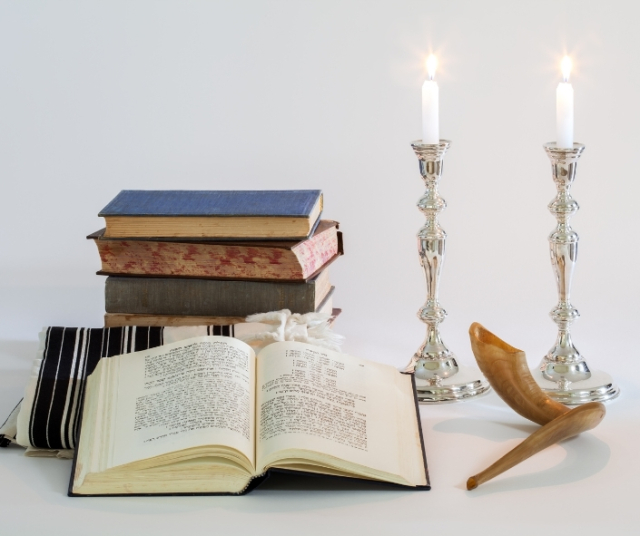On September 24 on the Jewish calendar, Yom Kippur is a date that shines with deep spiritual significance. Known as the " Day of Atonement ," this holiday holds a special place in the hearts of the Jewish community around the world.
Origins and History of Yom Kippur
The roots of Yom Kippur go back to biblical times, finding its foundations in the sacred Jewish scriptures. This holiday is highlighted in the book of Leviticus, a fundamental part of the Old Testament. The importance of Yom Kippur lies in its deep spiritual significance and how it has held up over the centuries as a momentous commemoration in Jewish life.
The term " Yom Kippur " comes from Hebrew and is translated as the " Day of Atonement ". In the ancient Jewish religion, this day was a time of great solemnity and reflection. According to tradition, the high priest performed a special ritual in the Jerusalem Temple to purify the community of their sins. This ritual involved a series of offerings and sacrifices with the aim of seeking divine forgiveness and reconciliation with God.
The festivity had a collective and community character. It was a day when the Jewish community came together to confess their sins and repent. Furthermore, it marked the only day of the year when the high priest was allowed to enter the Holy of Holies, the holiest part of the Temple, to present offerings and perform rituals on behalf of the community.
With the destruction of the Temple in Jerusalem in AD 70, the way Yom Kippur was observed changed significantly. However, the spirit of the festivity remained intact. The importance of introspection, repentance, and the search for reconciliation with God and neighbor continued to be at the core of Yom Kippur.
Over the centuries, Yom Kippur has evolved as a holiday that encompasses a wide range of practices and customs. Although the Temple no longer exists, the Yom Kippur prayers and rituals remain an integral part of the observance. The Jewish community around the world gathers in synagogues to recite special prayers expressing repentance and supplication. Fasting, the confession of sins and the search for forgiveness continue to be central elements of the festival.
Yom Kippur Meaning and Symbolism
Yom Kippur is considered a day of forgiveness and reconciliation. In Jewish tradition, it is believed that on this day, God evaluates each individual's actions and repentance. The process of introspection and personal confession is a fundamental part of the festivity. It is believed that by acknowledging and repenting of mistakes, reconciliation with both God and others can be achieved.
The blowing of the shofar, a ram's horn, marks the end of Yom Kippur, symbolizing a new beginning and a call to reflection. The shofar also appears on other Jewish holidays, such as Rosh Hashanah, the Jewish New Year, connecting these celebrations in a cycle of repentance and renewal.
Yom Kippur Rituals and Customs
Yom Kippur rituals and customs are fundamental elements that give depth and meaning to this spiritual holiday. These practices rooted in Jewish tradition allow the faithful to connect with their most intimate beliefs and carry out a deep introspection during this holy day.
Fasting and Abstinence
Fasting is one of the highlights of Yom Kippur. From sunset until the following night, the Jews abstain from eating and drinking. This fast is an expression of humility and giving up material needs in favor of a complete dedication to spirituality and prayer. Abstinence also symbolizes physical and spiritual purification, allowing for a deeper connection with God and community.
white clothing
A significant custom on Yom Kippur is to wear white clothing. White symbolizes purity and the aspiration for a more virtuous life. By wearing this special garment, the faithful seek to purify their souls and approach God with sincerity and humility.
Prayer and Reflection
The heart of Yom Kippur is prayer and reflection. Synagogues organize special and extended services that include a series of prayers and readings from the holy scriptures. During these services, the faithful recite prayers of repentance and supplication, expressing their desire for divine forgiveness and reconciliation. Biblical passages read during Yom Kippur emphasize themes of atonement and seeking divine mercy.
confession of sins
The confession of sins is an integral part of Yom Kippur. During the day, the faithful participate in the Viduy, a prayer in which they confess before God for the sins committed during the previous year. This confession is an act of humility and recognition of one's own imperfection, and it is a step towards purification and reconciliation.
kol nidrei
One of the highlights of Yom Kippur is the recitation of "Kol Nidrei", a prayer said at the beginning of the holiday during the night. This prayer emphasizes the importance of keeping commitments and promises made to God. Its deep and evocative melody sets the emotional tone for the holiday, recalling the seriousness of the day and the need to keep words and commitments.
The Blowing of the Shofar
The shofar, a ram's horn, is a fundamental instrument in various Jewish holidays. On Yom Kippur, the blowing of the shofar marks the end of the holiday, emphasizing a new beginning and the possibility of a redeemed future. Its resounding call is an invitation to reflect on past actions and commit to a path of continuous improvement.
Yom Kippur in Contemporary Life
As society evolves, the relevance of Yom Kippur remains profound. Although modern life may seem very different from biblical times, the themes of repentance, forgiveness, and renewal remain universal. Yom Kippur provides a space to disconnect from worldly concerns and reflect on past and future actions.
Today, Yom Kippur also has a social impact. The idea of asking for forgiveness and seeking reconciliation can inspire people to try to resolve personal conflicts and work towards community unity. The holiday also encourages solidarity with the less fortunate, as many Jews choose to donate to charities on this day.
